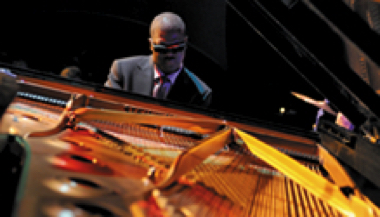
Nick Bewsey, March 2015

Nick Bewsey has been writing about jazz for ICON since 2004 and is a member of The Jazz Journalists Assoc. He also participates in DownBeat’s Annual International Critics Poll.
Duane Eubanks Quintet ★★★★1/2
Things Of That Particular Nature
Sunnyside
Trumpeter Duane Eubanks isn’t as well known as his brothers (trombonist Robin and guitarist Kevin) yet, but his highly listenable album, Things Of A Particular Nature, should mitigate his under-the-radar status. This Philadelphia native is a top-notch musician, having fronted the horn section in the late pianist Mulgrew Miller’s group, Wingspan, and as a member of two-time Grammy-winning Dave Holland Big Band, while playing with
many others. He’s such a solid
performer with a tone so sweet and
clear that you wish he could have
put out more records during the ten-
year gap since his previous solo effort.
Timing seems to be everything for
Eubanks, and certainly his time is now.
Things is a state-of-the-art
modern jazz recording, deeply
grounded in swing and vigorously performed by Eubanks and his all-star band—the smooth-toned tenor saxophonist Abraham Burton; pianist Marc Cary; bassist Dezron Douglas; drummer Eric McPherson; and the incomparable Steve Nelson on vibraphone. Artfully co-produced with his wife, Aleta Eubanks and McPherson, the record serves up a feast of Eubanks originals and a lovely ballad track written by Miller.
This stout group floods your ears with fine sounds throughout, starting with “Purple, Blue, and Red,” a hot swing track of fast grooves and absorbing solos. There’s a warm slice of soul-jazz (“Rosey”) and plenty of razor-sharp improvisation (the finger-popping “As Is” and “P”). A spontaneous, brief, in-the-studio moment—“Anywhere’s Paradise”—fades in and out as a mysterious yet sure-footed blues, with a beautiful melody that recalls Herbie Hancock’s exotic tune, “Mimosa.” It’s a tease that leaves us wanting more. However, “Dance With Aleta” is a true highlight, an acoustic thrill, full of good feeling and swing. Obviously, Mrs. Eubanks doesn’t deserve less, but ultimately it’s Duane Eubanks that you’ll be hooked on. (10 tracks; 54 minutes)
Art Hirahara ★★★1/2
Libations and Meditations
Posi-Tone
As interesting and involving as pianist
Art Hirahara’s debut recording Noble Path
(Posi-tone, 2011) was, his sophomore release
gives him the chance to expand his creative
palette. The intriguingly titled Libations and
Meditations pairs Hirahara with superior
musicians, the much in-demand bassist
Linda Oh and furiously creative drummer
John Davis. As a unit, they open up the
leader’s compositions to their fullest, improvising together with a capacious degree of ingenuity.
The mostly original set—there are two excellent covers, including the swinging “Only Child” by Bill Evans—takes time to find its flow, but when it does about halfway through, we’re already invested in Hirahara’s musical stories. The best tunes include “Father’s Song,” perhaps a play on the title of the famous Horace Silver standard, but the melody is majestic and Hirahara injects a welcome intensity in his soloing in lock step with his trio. The suggestively titled “Dead Man Posed” is touching and beautifully lyrical, while the impressionistic “Big Country” has a sinewy modern pop groove. These tunes spotlight Hirahara’s songwriting and playing quality well.
The former Bay-area musician, now based in NY, is on solid ground on this disc. You can imagine the pleasure of hearing these tunes played live in a club. Libations has a late night vibe, where it’s easy to picture the proficient Hirahara leaning in at the keys, with his post-bop piano skills and self-assured sense of swing at the fore. (11 tracks; 52 minutes)
Marcus Roberts and the Modern Jazz Generation ★★★★1/2
Romance, Swing and the Blues
J-Master
There are jazz pianists who lead their own bands. and then there is the innovative Marcus Roberts, an Ellington acolyte and original Young Lion along with his peer, bandleader and collaborator Wynton Marsalis. Though some critics shrugged
when Roberts released his early opus,
Deep In The Shed (Novus, 1998), many
—including me—found that work
exhilarating and an essential jazz recording.
The double-disc Romance, Swing
and the Blues was originally commissioned
by Jazz at Lincoln Center in 1993, but this
newly recorded (2013) grand scale work
with a 12-piece band is an honest fulfillment of Roberts’ early promise as a leader, orchestrator, composer and pianist. The Modern Jazz Generation features Roberts and his trio, bassist Rodney Jordan and drummer Jason Marsalis along with veterans like trumpeter Marcus Printup, tenor saxophonist Stephen Riley and trombonist Ron Westry, and rounded out by a precocious group of younger up-and-comers.
Roberts reaches into the classical tradition (i.e. Gershwin) and plays with an authentic signature style absorbed from 20th-century jazz composers like Ellington, Jelly Roll Morton, Monk and Nat Cole, to name a few. A genuine virtuoso, the pianist composes stories where the instrumentation becomes the characters that invoke the adventure, mystery, romance or conflict that’s woven through Roberts’ tunes.
The measure of Roberts’ writing skill and leadership is faultless. This engrossing work telegraphs its intentions with song titles like “A Festive Day,” “Evening Caress,” It’s a Beautiful Night To Celebrate,” and the provocative “Being Attacked By The Blues.” The latter tune decidedly marks its territory beginning with a deep, thick bass solo. It’s a poetic start to disc 2 that segues into a duet with a crisp and jaunty Roberts, before the band leaps in—that smooth brass sound is indicative of the engine that propels the pianist’s compositions. That, and a whole lot of syncronized swing.
There’s no style that escapes Roberts’ pen or his playing. If you caught his profile on 60 Minutes in 2014, you understand that he’s a musical encyclopedia of jazz. The tunes on Romance are thoughtfully sequenced and each stands on its merit, making this album essential as well.. “The Mystery Of Romance” off the first disc typifies all the emotional elements at Roberts’ disposal—syncopated rhythms, big band swing and sweeping harmonies all blend easily. Roberts’ fealty to Ellington and the Marsalis tradition of jazz (that New Orleans flavor is liberally applied) may confound those with a modern jazz bent, but Marcus Roberts is a one-of-a-kind master, relentlessly inventive and just as modern in his own way. (Disc 1: 6 tracks; 49 minutes/Disc 2: 6 tracks; 54 minutes)

